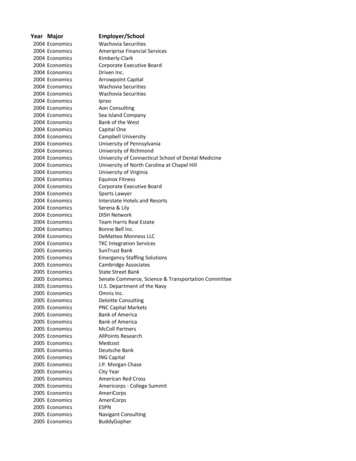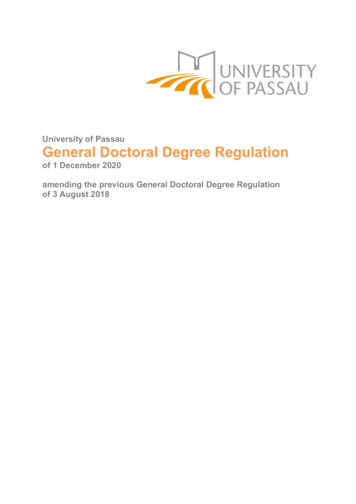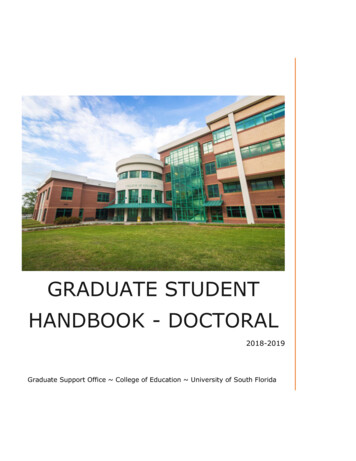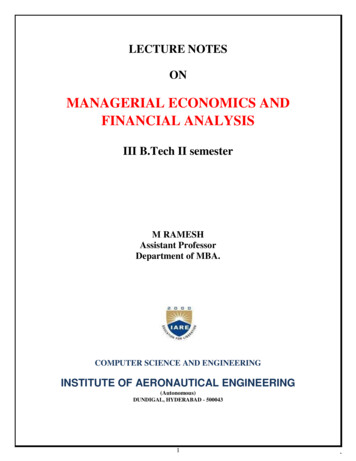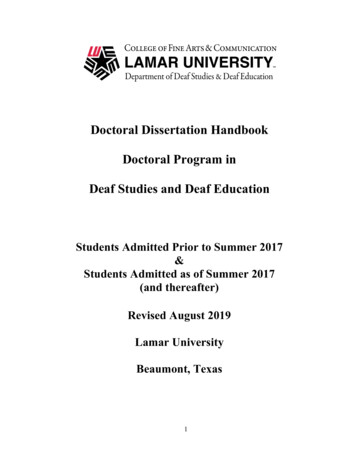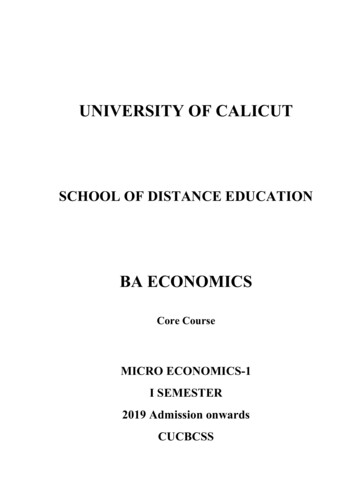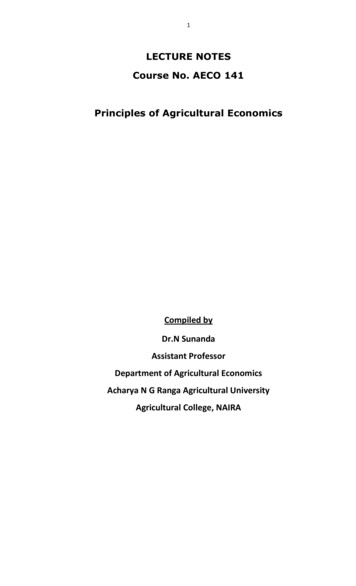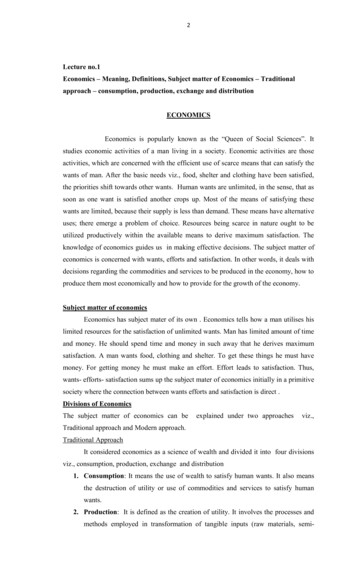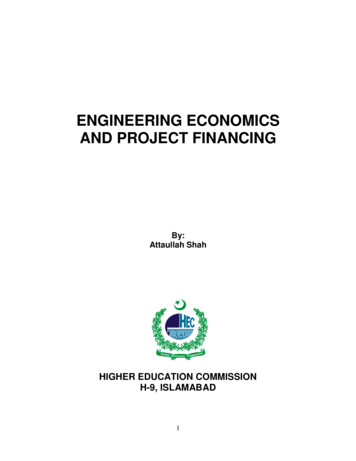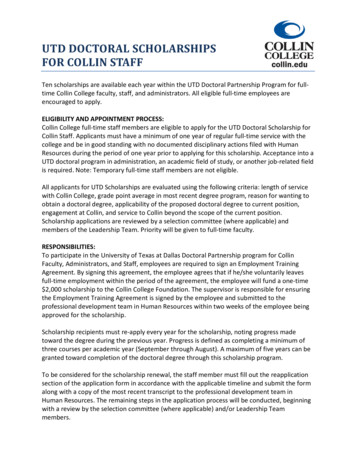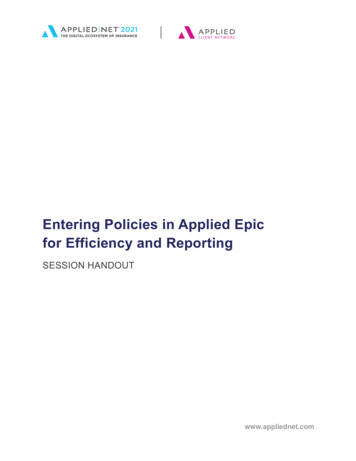
Transcription
Doctoral Program in Applied EconomicsPHD CANDIDATES AVAILABLE FORPOSITIONS IN THE ACADEMIC YEAR2021-2022Placement Director:Gilles DurantonPhone: (215) 898-2859Email: duranton@wharton.upenn.eduGraduate Administrator:Dhivya KaushikPhone: (215) 898-1197Email: dhivya@wharton.upenn.eduPlacement plied-economics-job-marketcandidates/
Applied Economics Job Market Candidates 2021-2022Rui YuJMP: “Returns to Political Contributions in Local Housing Markets”FIELDS: Urban Economics and Real Estate, Public Finance, Applied Microeconomics, and PoliticalEconomyADVISORS: Fernando Ferreira, Joseph Gyourko, Gilles Duranton, Marc MeredithEMAIL: ruiyu@wharton.upenn.eduPhilip MulderJMP: “Mismeasuring Risk: The Welfare Effects of Flood Risk Information”FIELDS: Real Estate and Household Finance, Environmental Economics, Applied MicroeconomicsADVISORS: Olivia S. Mitchell, Benjamin J. Keys, Benjamin B. Lockwood, Arthur van BenthemEMAIL: pmulder@wharton.upenn.eduAngela GunnJMP: “Water Quality Management in a Federalist Setting”FIELDS: Environmental Economics, Applied Microeconomics, Developmental EconomicsADVISORS: Arthur van Benthem, Jose (Mike) Abito, Mariaflavia (Nina) HarariEMAIL: abtgunn@wharton.upenn.eduTony Lizhang HeJMP: “The Value and Constraints of Corporate Political Connections: Evidence from European Firms”FIELDS: Nonmarket Strategy, Stakeholder Theory, Corporate Social Responsibility, Political Economy,Multinational Enterprise NetworksADVISORS: Witold J. Henisz, Jose (Mike) Abito, Benjamin LockwoodEMAIL: tonyhe@wharton.upenn.edu
RUI /profile/ruiyu/ruiyu@wharton.upenn.eduWHARTON SCHOOL, UNIVERSITY OF PENNSYLVANIAPlacement Director: Gilles DurantonGraduate Student Coordinator: Dhivya enn.edu(215) 898-2859(215) 898-1197Office Contact Information419C Vance Hall3733 Spruce StreetPhiladelphia, PA 19104(732) 325-7826Personal Information:November 6th, 1991, Male, U.S. CitizenUndergraduate Studies:B.A., Economics-Mathematics, Columbia University, with Honors, 2014Graduate Studies:Wharton School, University of Pennsylvania, 2016 to presentThesis Title: “Essays on Urban Economics and Public Finance”Expected Completion Date: May 2022References:Fernando Ferreira (Advisor)C. F. Koo Professor430 Vance Hall3733 Spruce StreetPhiladelphia, PA 19104(215) 898-7181fferreir@wharton.upenn.eduGilles DurantonDean’s Chair in Real Estate Professor452 Vance Hall3733 Spruce StreetPhiladelphia, PA 19104(215) 898-2859duranton@wharton.upenn.eduJoseph GyourkoMartin Bucksbaum Professor448 Vance Hall3733 Spruce StreetPhiladelphia, PA 19104(215) 898-3003gyourko@wharton.upenn.eduMarc MeredithAssociate Professor403 Ronald O. Perelman Center133 S. 36th StreetPhiladelphia, PA 19104(215) 746-7672marcmere@sas.upenn.eduTeaching and Research Fields:Primary: Urban Economics and Real Estate, Public FinanceSecondary: Applied Microeconomics, Political Economy
Teaching Experience:University of Pennsylvania:Fall, 2020Managerial Economics (Executive MBA), TA for Kent SmettersFall, 2019Urban Fiscal Policy (Undergraduate/MBA), TA for Fernando FerreiraFall, 2018Managerial Economics (Undergraduate), Head TA for Eduardo AzevedoColumbia University:Fall, 2013Intermediate Macroeconomics (Undergraduate), TA for Jon SteinssonResearch Experience and Other Employment:2018-2019Research Assistant for Fernando Ferreira and Maisy WongWharton School, University of Pennsylvania2017-2018Research Assistant for Fernando Ferreira and Joe GyourkoWharton School, University of Pennsylvania2014-2016Senior Research AnalystResearch and Statistics, Federal Reserve Bank of New YorkProfessional Activities:Presentations: Urban Economics Association, 2019, 2021; Summer School in UrbanEconomics, 2018; MIDAS Seminar, 2018; Wharton Seminars, 2018 2021Service:Wharton-INSEAD Doctoral Consortium, Executive Committee, 2019; WhartonInnovation Doctoral Symposium, Organizing Committee, 2019Honors, Scholarships, and Fellowships:2021Urban Economics Association Prize for Best Student Paper2021University of Pennsylvania Graduate Center Grant2021Robert R. Nathan Fellowship2019, 2020Graduate and Professional Student Assembly Grants2019Becker-Friedman Institute Price Theory Summer Camp2019George James Term Fund2018, 2019Zell/Lurie Real Estate Center Research Grants2018, 2019Mack Institute for Innovation Management Research Grants2018, 2019Applied Economics Travel GrantsWharton Doctoral Fellowship2016 20212016NSF Graduate Research Fellowship, Honorable MentionResearch Papers and Projects:“Returns to Political Contributions in Local Housing Markets” (Job Market Paper)This paper investigates whether firms donate to political campaigns in order to influence supply inone of the largest markets in the U.S.—housing. A model of electoral competition and special interestpolitics highlights two mechanisms for this to occur: firms can be buying favors or supporting policy.I assess which mechanism determines local housing supply by investigating residential constructionfirms that give money to mayoral candidates. To do this, I collect the first large-scale, comprehensivedataset of campaign donors in U.S. mayoral races. I employ a firm-level regression discontinuitydesign around close mayoral races to evaluate the mechanism of buying favors. Donating to anarrowly elected mayor substantially increases that firm's growth of new property sales by 243.8thousand per year. Favors appear after sufficient time to build, increase for bigger donations, areconcentrated among powerful mayors, and matter more for incumbent firms. Participating in local
politics does entail political risk; donors to the runner-up see declining sales. Otherwise mayors donot appear to bar entry of their donor's competitors. I then evaluate the mechanism of supportingpolicy by exploiting an aggregate, city-level RD design. Pro-development mayors that attract moreconstruction donors more than double new housing permits citywide over five years. This total effectdwarfs the sum of private favors to donors, as even non-supporters sell more. Taking these estimatestogether, a model-based decomposition shows the supporting policy mechanism dominates. 70.1% ofthe impact of a pro-development mayor on housing supply is due to differences in housing policybetween candidates. Translating the effect into levels, 10.2% of total permits issued every year in anAmerican city are favors to political donors.“The Political Economy of Federal Procurement” with Philip MulderThe federal government awards nearly 500 billion each year to firms and entities to delivergovernment services. We propose to study how firms use campaign contributions to influence federalcontracts and the effect of this influence on procurement efficiency and local economic outcomes. Westudy these questions by quasi-experimental variation in contract awards stemming from closeelections linked to contributions from contractors. Detailed micro-data on federal awards are matchedto federal campaign donors. The merged dataset surfaces a number of salient findings. Althoughfirms competing for federal contracts are forbidden from donating to politicians, 13.6% of contractorshad an employee who donated to federal candidates in the 2014 election cycle. These contractorsearned 83.7% of the total value of federal contracts in that period. Moreover, their employees whocontributed disproportionately worked in executive or government affairs roles relative to thepopulation of contributors. Federal contractors associated with donors earned more no-bid awardsthan non-donors. In the federal response to the Covid-19 crisis, doubling a contractor’s politicalbeneficiaries in Congress caused the contractor to earn 54.0% more awards.“The Homeownership Society” with Rafael Pucci and Rafael TavaresCan owning a home change your labor market outcomes or political beliefs? Programs promotinghomeownership are a major political agenda around the world, yet the economic rationale is disputed.We investigate how becoming a homeowner can affect a range of labor market outcomes and politicalparticipation in a development context. To do this, we combine individual-level data from a largescale housing lottery in Brazil between 2009 and 2016. We link individual recipients to new data onapplicants and administrative micro-data on the universe of formal employment and politicalparticipation. We find evidence that becoming a homeowner increases both individuals' formal laborparticipation and political participation.“The Economics of Price Gouging” with Felipe Flores-Golfin“Electoral Shocks to the Banking Network”Publications:Abrahams, Michael, Tobias Adrian, Richard Crump, Emanuel Moench, and Rui Yu. "Decomposing Real and Nominal Yield Curves." Journal of Monetary Economics 84 (2016): 182-200.Technical Skills:Stata, Python, Matlab, R.Preferred Pronunciation:REE YOO
PHILIP omepmulder@wharton.upenn.eduTHE WHARTON SCHOOL, UNIVERSITY OF PENNSYLVANIAPlacement Director: Gilles DurantonGraduate Student Coordinator: Dhivya enn.edu215-898-2859215-898-1197Contact Information3733 Spruce Street; 400 Vance HallPhiladelphia, PA 19104269-823-8100Graduate StudiesThe Wharton School, University of Pennsylvania, 2017 to presentThesis Title: “Essays on the Economics of Disaster Risk”Expected Ph.D. Completion Date: May 2022Thesis Committee and References:Professor Olivia S. Mitchell (committee chair)The Wharton School, University of Pennsylvania,mitchelo@wharton.upenn.eduProfessor Benjamin J. Keys (dissertation supervisor)The Wharton School, University of Pennsylvaniabenkeys@wharton.upenn.eduProfessor Benjamin B. LockwoodThe Wharton School, University of r Arthur van BenthemThe Wharton School, University of Pennsylvaniaarthurv@wharton.upenn.eduUndergraduate StudiesBachelor of Arts, Mathematics and Economics (summa cum laude), Kalamazoo College, 2015General Course, Mathematics, The London School of Economics, 2014Teaching and Research Fields:Primary: Real Estate and Household Finance, Environmental Economics, Applied MicroeconomicsSecondary: Urban Economics, Public EconomicsTeaching Experience:Fall 2021Evaluating Evidence, WhartonGuest Lecturer for Professor Iwan BarankaySpring 2020Environmental and Energy Economics and Policy, WhartonTeaching Assistant for Professor Arthur van BenthemFall 2019Honors Intermediate Microeconomics, WhartonTeaching Assistant for Professor Gilles Duranton2014-2015Probability, Calculus, and Real Analysis, Kalamazoo CollegeTeaching Assistant for Professor John Fink
Research Experience:2018-2020Research Assistant to Professor Benjamin KeysThe Wharton School2015-2017Senior Research AnalystFederal Reserve Bank of New York, Money and Payment Studies2014Summer Research AnalystFederal Reserve Bank of New York, Money and Payment StudiesProfessional Activities2021DiscussantAmerican Real Estate and Urban Economics Association National Meeting2019Invited ParticipantBerkeley/Sloan Summer School in Environmental and Energy EconomicsReferee ServiceReview of Economics and Statistics, Journal of Urban Economics,Journal of Pension Economics and Finance,Environment Systems and DecisionsHonors, Scholarships, and Fellowships:2020, 2021Russell Ackoff Doctoral Student Fellowship2019, 2020, 2021Bradley Graduate Fellowship2018Amy Morse Award (top 1st year Ph.D. student in Applied Economics)Research Papers:Mismeasuring Risk: The Welfare Effects of Flood Risk Information (JOB MARKET PAPER)Rapidly improving data and models are giving coastal homeowners more information abouttheir disaster risk while also increasing insurance premiums for the highest risk homes. Inthis paper, I estimate the economic consequences of flood risk information withadministrative flood insurance policy data and a novel survey measuring flood insurancedemand, risk perceptions, and objective risk. To identify the effects of risk information, Iuse variation in flood risk classification driven by outdated elevation data that caused highrisk homes to be misclassified as low-risk. My findings show that flood risk classificationprovides valuable information to homeowners. Misclassifying high-risk homes as low-riskcauses owners to underestimate their flood risk, invest less in risk-reducing adaptation, andbuy less flood insurance despite substantially lower premiums. Embedding these estimatesin a sufficient statistics model with dynamic risk and endogenous risk beliefs andadaptation, I find that identifying and pricing the estimated six million high-risk homesoutside the floodplain would increase social welfare by 30 billion over 10 years.
Neglected No More: Housing Markets, Mortgage Lending, and Sea Level Rise (with Benjamin Keys)In this paper, we explore dynamic changes in the capitalization of sea level rise (SLR)risk in housing and mortgage markets. Our results suggest a disconnect in coastal Floridareal estate: From 2013-2018, home sales volumes in the most-SLR-exposed communitiesdeclined 16-20% relative to less-SLR-exposed areas, even as their sale prices grew inlockstep. Between 2018-2020, however, relative prices in these at-risk markets finallydeclined by roughly 5% from their peak. Lender behavior cannot reconcile thesepatterns, as we show that both all-cash and mortgage-financed purchases have similarlycontracted, with little evidence of increases in loan denial or securitization. We proposea demand-side explanation for our findings where prospective buyers have become morepessimistic about climate change risk than prospective sellers. The lead-lag relationshipbetween transaction volumes and prices in SLR-exposed markets is consistent withdynamics at the peak of prior real estate bubbles.Conference Presentations:2021American Real Estate and Urban Economics Association ASSA MeetingNortheast Workshop on Energy Policy and Environmental Economics*NBER Real Estate Summer Institute2020Urban Economics Association Virtual MeetingWhat’s at Stake? Understanding the Role of Home Equity in Flood Insurance Demand(with Yanjun Liao)Millions of homeowners are exposed to increasing financial risk from natural disasters.Yet, many households are uninsured against the costliest disaster: flooding. We showthat low home equity is an important driver of low flood insurance take-up. To isolatethe causal effect of home equity on flood insurance demand, we exploit price changesover the housing boom and bust. Insurance take-up follows house price dynamicsclosely, with a home price elasticity around 0.3. Multiple mechanism tests suggest thatmortgage default acts as implicit disaster insurance. As a result, households do not fullyinternalize their disaster risk.Conference Presentations:2021Eastern Economics Association*OSU PhD Real Estate Finance ConferenceUCLA Climate Adaptation Symposium*2020*Presented by coauthorUrban Economics Association Virtual Meeting*
ANGELA com/view/angelabgunn/homeWHARTON SCHOOL, UNIVERSITY OF PENNSYLVANIAPlacement Director: Gilles DurantonGraduate Student Coordinator: Dhivya enn.edu215-898-2859215-898-1197Office Contact InformationVance Hall, 3rd Floor3733 Spruce StreetPhiladelphia, PA 19104415-471-9231Undergraduate Studies:Bachelor of Arts in Economics (minor in Mathematics), Pomona College, 2014Graduate Studies:Wharton School, University of Pennsylvania, 2017 to presentThesis Title: “Essays on Strategic Choices over Impaired Water Quality”Expected Completion Date: May 2022Thesis Committee and References:Arthur van Benthem (committee chair)Associate ProfessorWharton School, University of Pennsylvaniaarthurv@wharton.upenn.eduJose (Mike) Abito (dissertation supervisor)Assistant ProfessorWharton School, University of Pennsylvaniaabito@wharton.upenn.eduMariaflavia (Nina) HarariAssistant ProfessorWharton School, University of Pennsylvaniaharari@wharton.upenn.eduResearch Fields:Primary fields: Environmental Economics, Applied MicroeconomicsSecondary fields: Development EconomicsTeaching Experience:Fall 2021Special Seminar Series in Electricity Markets to PA EPATeaching Assistant for Professors Arthur van Benthem and Jose (Mike) AbitoSpring 2021Environmental & Energy Economics and Policy (Wharton)Teaching assistant for Professor Arthur van BenthemFall 2019Managerial Economics (Wharton)Teaching assistant for Professors Gilles Duranton and Eduardo AzevedoResearch Experience and Other Employment:Fall 2020Research Assistant for Professor Jose (Mike) AbitoWharton SchoolSummer 2018Research Assistant for Professor Corinne Low
In collaboration with Innovation Poverty Action and the World Bank Gender LabWharton School (field research in Lusaka, Zambia)2014-2017Senior Research Analyst (2016 - 2017)Research Analyst (2014-2016)The Brattle Group, San Francisco, CAProfessional Activities2021Panelist3rd Year Re-orientation for Wharton Doctoral Students2021PhD Student LeaderIntroduction to Diversity in Doctoral Education and Scholarship (IDDEAS)Conference, Wharton School2019ParticipantBerkeley/Sloan Summer School in Environmental and Energy EconomicsResearch Papers in Progress:“Water Quality Management in a Federalist Setting” (Job Market Paper)I investigate spillover effects of state-level water quality enforcement on interstate waters. To separatethe effect of state level policy from other sources of water quality variation, I compare water quality in astate and its neighbors before and after the state receives federal authorization to conduct its ownpollution permitting programs. In preliminary estimates, I find no evidence of free-riding, but suggestiveevidence that water quality in border rivers improves when at least one border state receivesauthorization from the EPA.“Estimating Willingness to Pay for Water Quality in the United States” (with Felipe Flores Golfin)We estimate willingness to pay for drinking water quality in the US from consumers’ avoidancebehavior. Specifically, we use data on bottled water consumption and tap water quality to estimate ahousehold level discrete choice model of drinking water. We find that households are willing to pay anextra 0.8 to 1.8 cents per oz of bottled water (10% to 23% of the median price per oz of bottled water) toavoid a decrease of one standard deviation in water quality. We also find that willingness to payincreases with income.“Effects of Child Marriage Reform in Ethiopia”I investigate the effect of family law reform in Ethiopia which raised the minimum age of marriage to18. I rely on region-level variation in time of implementation to identify the reform's effects. Consistentwith prior literature, I find some positive effects, including a modest decline in very early marriage andsuggestive evidence that the reform disproportionately shifts more advantaged women from early toadult marriage. Furthermore, I find improvements with regards to underage fertility, education, andwives' decision-making power among women with exposure to community events and media access.However, I caution that these effects may be confounded by pre-existing trends. Taken collectively, myanalysis is unable to reject the hypothesis that reform followed, rather than caused, upward trends in ageat marriage.Technical Skills:Advanced: Stata, Excel. Intermediate: ArcGIS. Familiar: R, SAS.Personal:USA Citizen
Tony Lizhang HeThe Wharton SchoolUniversity of Pennsylvania3733 Spruce Street, 300 Vance HallPhiladelphia, PA, USA 19104-6302Phone: 1 (626) 487-3332E-mail: tonyhe@wharton.upenn.eduHomepage: http://www.tonylizhanghe.comEducationPh.D. in Applied Economics, The Wharton School, University of Pennsylvania, 2017–2022 (Expected)Dissertation: Essays on Corporate Political Activities and Firm-Stakeholder RelationshipsCommittee: Witold J. Henisz (chair), Jose (Mike) M. Abito, Benjamin B. LockwoodM.B.A., Harvard Business School, 2015B.S. in Biomedical Engineering, Johns Hopkins University, 2011Research InterestsNonmarket strategy, stakeholder theory, corporate social responsibility, political economy, multinationalenterprise networksPapersJournal ArticlesBusiness and Peace: The Impact of Firm-Stakeholder Relational Strategies on Conflict Risk (with BrianGanson and Witold J. Henisz). Academy of Management Review. In-Press, 2021.Working PapersThe Value and Constraints of Corporate Political Connections: Evidence from European FirmsRevise and Resubmit at Strategic Management Journal“Us” and “Them”: Corporate Strategic Activism, Horizontal Inequalities, and Society’s Capacity toAddress Its Grand Challenges (with Brian Ganson and Witold J. Henisz)Revise and Resubmit at Global Strategy JournalThe Conflict Risks of Political Patronage: Evidence from Multinational Corporations in Africa (withAnne S. Jamison)Corporate Scandals and the Opportunistic Entry of Sustainable Products
Grants, Fellowships, & AwardsMack Institute Student Research Fellowship, 2020Wharton Political Risk Lab Research Award, 2020UPenn GAPSA – Provost Fellowship for Interdisciplinary Innovation, 2019Samuel Zell and Robert Lurie Real Estate Center Research Grant, 2018Conference Presentations2021:Consortium on Competitiveness and Cooperation (CCC) Doctoral ConferenceStrategy and the Business Environment (SBE) Annual ConferenceAcademy of Management (AOM) Annual Meeting (Strategy Division)International Political Economy Society (IPES) Conference (paper accepted, to be held)2020:Academy of Management (AOM) Annual Meeting (Strategy Division)Strategic Management Society (SMS) Annual ConferenceReferee Service (Ad Hoc)Academy of Management Review (1x), Management Science (1x), Strategic Management Journal (2x)Teaching ExperiencesUndergraduate CoursesManagerial Economics (BEPP 250), Head Teaching Assistant, The Wharton School, 2019 & 2020For Professors Gilles Duranton, Eduardo Azevedo, and Max TroshkinOther ExperiencesGraduate Teaching Assistant Training, Instructor, Center for Teaching and Learning, University ofPennsylvania, 2020Introduction to Management, Instructor, Wharton Summer High School, 2018, 2019, & 2020Introduction to Entrepreneurship, Instructor, Wharton Summer High School, 2018, 2019, & 2020Co-Authored Harvard Business School (HBS) Case StudiesHenderson, Rebecca, and Tony L. He. "German Business and the Syrian Refugee Crisis." HarvardBusiness School Case 316-142, January 2016.Henderson, Rebecca, and Tony L. He. "Business and the Building of Inclusive Institutions." HarvardBusiness School Technical Note 316-156, March 2016.
Henderson, Rebecca, Amram Migdal, and Tony L. He. "Industry Self-Regulation: Sustaining theCommons in the 21st Century?" Harvard Business School Background Note 315-074, revised March2016.Henderson, Rebecca, Tony L. He, and Brian Tomlinson. "Reimagining Capitalism: Towards a Theory ofChange." Harvard Business School Case 316-162, April 2016.Cole, Shawn, and Tony L. He. "Farmers Business Network: Putting Farmers First." Harvard BusinessSchool Case 217-025, September 2016.Cole, Shawn, Mark Kramer, and Tony L. He. "DBL Partners: Double Bottom Line Venture Capital."Harvard Business School Case 217-022, September 2016.Gandhi, Vikram, and Tony L. He. "Pi Investments." Harvard Business School Case 317-039, September2016.Cole, Shawn, and Tony L. He. “Generation Investment Management: 2016.” Harvard Business SchoolCase 217-031, October 2016.Cole, Shawn, and Tony L. He. "Mindspark: Improving Educational Outcomes in India." HarvardBusiness School Case 217-060, March 2017.Work ExperiencesFull-Time Positions2015-2017: Senior Researcher at Harvard Business School (for Professors Rebecca Henderson and ShawnCole), Boston, MA2011-2013: Economic Analyst at Analysis Group, Inc., Boston, MAInternships2014: Quantitative Marketing & Predictive Analytics Analyst at Sigma-Aldrich (Merck), St. Louis, MO2013: Policy Analyst and Campaign Canvasser at Mass Alliance (for MA State Representative JayLivingstone and MA State Senator Linda Dorcena Forry), Boston, MA2010: Community Impact Associate at Moveable Feast, Baltimore, MDPersonalUSA citizen. Fluent in Mandarin & Cantonese. Avid tennis player.
Thesis Title: "Essays on Urban Economics and Public Finance" Expected Completion Date: May 2022 References: Fernando Ferreira (Advisor) C. F. Koo Professor Gilles Duranton Dean's Chair in Real Estate Professor 430 Vance Hall 3733 Spruce Street Philadelphia, PA 19104 452 Vance Hall 3733 Spruce Street Philadelphia, PA 19104 (215) 898-7181

